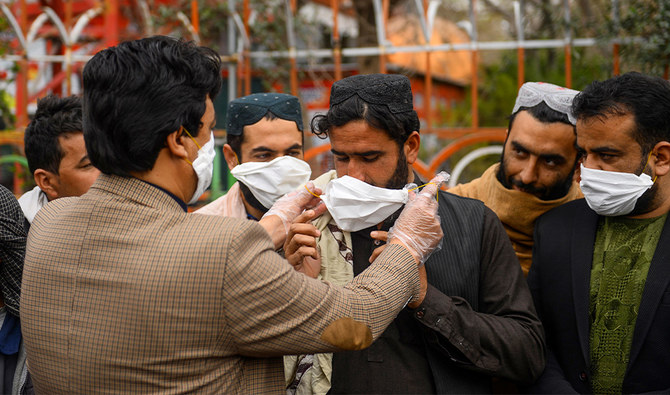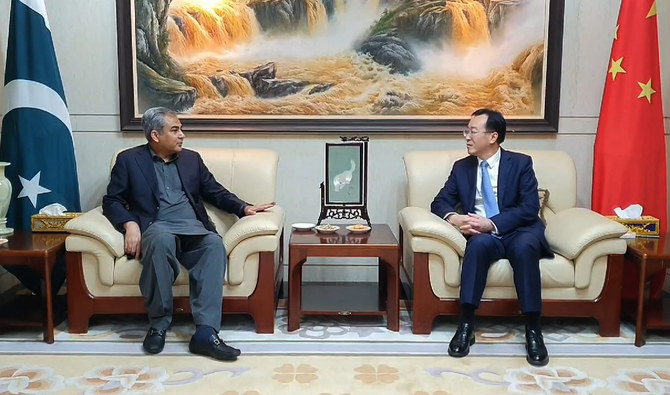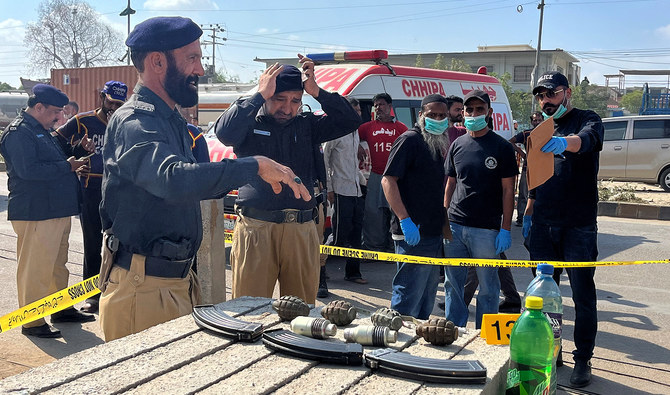ISLAMABAD: With porous borders, creaking hospitals and large illiterate populations, Afghanistan and Pakistan face a potentially devastating health crisis after the new coronavirus erupted in neighboring Iran.
Islamabad has closed official border crossings while Kabul has suspended all travel to the Islamic republic, which has reported 15 deaths out of nearly 100 infections -- making it one of the hardest-hit countries outside the virus epicenter China.
But experts fear the measures could prove ineffective with thousands of people -- refugees fleeing violence, Shiite pilgrims, smugglers, and migrants looking for work -- likely crossing the long, poorly patrolled frontiers every day.
The virus has spread to more than 25 countries, killing over 2,700 and infecting 80,000, mostly in China. But new outbreaks in Europe, the Middle East and in Asia have fanned fears of the contagion taking hold in poor nations which lack the healthcare infrastructure to cope.
Afghanistan announced Monday its first virus infection involving a patient who had recently been in Iran where millions of Afghans live.
Afghan television and radio broadcasts have begun advising people on how to prevent transmission of the virus, while residents have rushed to buy face masks -- straining supplies and sparking a tenfold increase in the cost of a single mask at some pharmacies in the capital Kabul.
"We are worried, we don't have a properly functioning health system and the borders are open. All we can do is take some preventive measures and pray to God to help us," said Ihsanul Haq, a government employee.
Afghanistan's healthcare system is in tatters after more than four decades of war, with the few available hospitals focused mainly on basic care and trauma. They lack the expertise to deal with infectious diseases.
"It could be a disaster if the virus really spreads all over the country. There aren't that many health centers," said Wali, a Kabul-based physician, who specializes in viral infectious diseases.
"The government is doing what it can to contain the spread of the virus. But it is very difficult."
Adding to the challenge of limiting the spread of the virus is the Afghan tradition of greeting family and friends with handshakes, hugs, and kisses.
A largely illiterate population also makes it difficult to educate people about ways to stop the transmission.
"People are illiterate, you can't get the message through to them," Wali said.
Across the border, in Pakistan, there are growing fears over how the country would deal with a potential outbreak.
Islamabad has a history of failing to contain infectious diseases such as polio, tuberculosis, and hepatitis.
Adding to the challenge, hundreds of thousands of quack doctors are thought to be working across the country and scandals involving the use of dirty needles in healthcare settings have eroded public trust in the system.
"If such a contagious illness were to enter the country, one can only imagine the toll it would take on the already overburdened and under-resourced healthcare system," read an editorial in the English daily Dawn.
Indeed, some Pakistani students trapped in the Chinese city of Wuhan -- where the virus was first detected in December -- told AFP recently they were nervous about returning to their country if authorities were to evacuate them.
"We are worried about how the authorities are going to treat us when we go back to Pakistan -- some students who went back told us the officials treated them very badly," Ruqia Shaikh said.
While Pakistan has closed land borders with Iran, it has maintained air travel to and from China -- increasingly a source of trade and commerce for the country.
"There is a limited concept of prevention, unfortunately. I fear it's not well prepared at all for any health emergency," Pakistani public health expert Arshad Altaf told AFP.
Pakistan this week moved quickly to quarantine at least 270 people near the Iranian border after a group of pilgrims returned and briefly mixed with other residents.
That came hours after Pakistan sealed off its frontier with Iran in southwestern Balochistan province, which remains vulnerable to a public health emergency.
Decades of fighting a separatist insurgency and militant violence, along with neglect from the central government, have left the impoverished area with little infrastructure.
Ziaullah Langove, Balochistan's home minister, said there were nearly 10,000 Pakistanis still in Iran, mostly students and pilgrims that Iranian officials were planning to send back in small groups.
At the Taftan border crossing, long queues of trucks waited in hope of being allowed into Iran, as residents and officials donned surgical masks.
"There is no information sharing whatsoever," said resident Khuda Baksh, chiding officials for failing to keep locals informed about the situation.
"There is fear and panic among the public, our business and lives are at risk."
'Fear and panic' as virus threatens Afghanistan, Pakistan
https://arab.news/mnk7t
'Fear and panic' as virus threatens Afghanistan, Pakistan

- Islamabad has closed official border crossings while Kabul has suspended all travel to Iran
- Virus has spread to more than 25 countries, killing over 2,700 and infecting 80,000, mostly in China
Pakistan anticipates more high-level Saudi business delegations amid stronger bilateral ties

- Foreign office says the two countries are involved in robust dialogue that has gained significant momentum
- It categorically denies reports that Pakistan is providing military bases to any foreign country against anyone
ISLAMABAD: Pakistan anticipates continued visits by high-level business delegations from Saudi Arabia in the upcoming weeks to further explore investment opportunities facilitated under the Special Investment Facilitation Council (SIFC), the foreign office announced on Thursday.
The statement came just days after Prime Minister Shahbaz Sharif concluded his visit to Riyadh, where he addressed the two-day World Economic Forum conference that began on April 28.
During his visit, Sharif met with Crown Prince Mohammed bin Salman and several Saudi ministers to strengthen bilateral relations and economic partnerships between the two nations.
Prior to his visit to the kingdom, Saudi Foreign Minister Faisal bin Farhan was in Islamabad with a large delegation, saying the Pakistani administration’s resolve to strengthen the economy would yield “significant benefits.”
“Saudi investors have been coming to Pakistan in recent months, and engaged with the SIFC in terms of exploring opportunities for Saudi investments in Pakistan, and this is an ongoing process, and we expect similar high-level business delegations to undertake visits to Pakistan in the coming days and weeks as well,” foreign office spokesperson Mumtaz Zahra Baloch told reporters in her weekly media briefing.
She added that both countries were involved in robust and mutually beneficial dialogue that had gained significant momentum in recent months.
“Pakistan and Saudi Arabia are engaged in consultations with each other in terms of increased Saudi investments in Pakistan, including in the energy domain,” she added.
Asked about reports of Pakistan providing military bases to the United States, Baloch called them baseless rumors.
“Pakistani has no plan to provide any bases to a foreign country against any other country,” she continued.
Speaking about the Organization of Islamic Cooperation’s summit in Gambia, the spokesperson said the country’s deputy prime minister Ishaq Dar would highlight the ongoing genocide in Gaza, the right to self-determination of the people of Jammu and Kashmir, the imperatives of solidarity and unity of the Muslim Ummah, rising Islamophobia, issues of climate change, terrorism, and other contemporary global challenges.
She said Pakistan strongly condemned the escalating violations of human rights by Israel and increasing number of illegal Israeli settlements in the West Bank.
“Israel’s actions constitute a breach of international law, including humanitarian laws and other pertinent international laws, and these acts also undermine any prospects of a two-state solution,” she added.
Pakistan vows ‘foolproof security’ for Chinese nationals after militant attacks

- Interior minister says government implementing strict security protocols for safe movement of Chinese workers
- A suicide bomber targeted a convoy of Chinese nationals near Dasu earlier this year, killing five of them
ISLAMABAD: Pakistan’s interior minister Mohsin Naqvi said on Thursday the government would ensure “foolproof security” for Chinese nationals following militant attacks targeting them in the country where most of them have been working on infrastructure development projects.
Naqvi made this assurance during his visit to the Chinese consulate in Karachi, where he discussed the issue in his conversation with a top diplomat Yang Yuandong, who welcomed the minister to the facility.
Five Chinese nationals were killed earlier this year in March after a suicide bomber rammed an explosives-laden vehicle into their convoy which was on its way from Islamabad to the site of a key hydroelectric dam in Dasu.
Prior to that, Chinese workers also came under attack by Baloch separatists near the Gwadar port. The incident led to the death of eight militants.
“It is our duty to ensure foolproof security for Chinese citizens,” Naqvi said during the during his visit to the consulate. “Strict implementation of standard operating procedures for safe movement of Chinese citizens is being ensured.”
Pakistan took action against a number of senior officials after the Dasu attack, saying they showed negligence and had failed to follow the security protocol.
He said the “enemy” wanted to undermine the China-Pakistan friendship but would not succeed.
According to a statement circulated by the ministry, the Chinese diplomat expressed satisfaction with the overall security plan for the protection of the Chinese workers.
Pakistan’s cricket body names 18-player squad for T20I series against England, Ireland

- A 15-player squad for the ICC Men’s T20 World Cup will be announced before the May 24 deadline
- Fast bowler Haris Rauf along with all-rounders Hasan Ali and Salman Ali Agha have been recalled
ISLAMABAD: The Pakistan Cricket Board (PCB) on Thursday announced the 18-player squad for the upcoming T20I series against Ireland and England & Wales beginning on May 10 and continuing till the end of the month.
According to a PCB statement, the squad will be reduced to 15 players for next month’s ICC Men’s T20 World Cup 2024 after the first T20I at Leeds on 22 May to meet the ICC’s 24 May deadline.
The men’s national selection committee has recalled fast bowler Haris Rauf, along with all-rounders Hasan Ali and Salman Ali Agha, in the 18-player squad.
The two cricketers who did not make the cut from the original 17-player squad that faced New Zealand are wrist spinner Usama Mir and fast bowler Zaman Khan.
“Crafting this squad was a challenging task due to the outstanding talent available,” the PCB selection committee was quoted in the statement. “After thorough deliberation and considering various cricketing aspects, we have finalized 18 players.”
“The squad encompasses a robust top-order featuring Babar Azam, Fakhar Zaman, Mohammad Rizwan, Saim Ayub and Usman Khan; an effective middle-order with Azam Khan, Iftikhar Ahmed and Muhammad Irfan Khan; versatile all-rounders in Imad Wasim, Shadab Khan and Salman Ali Agha; a pace battery led by Mohammad Abbas Afridi, Mohammad Amir, Naseem Shah, Haris Rauf, Hasan Ali and Shaheen Shah Afridi; and the spin prowess of Abrar Ahmed,” it continued.
“We understand Usama and Zaman will be disappointed and they should be as they must be looking ahead to the tours of Ireland and England,” the statement added. “They are quality cricketers and have long careers ahead of them. They need to continue to focus on their cricket so that they are available, if required.”
Haris Rauf and wicketkeeper-batter Azam Khan were sidelined for the New Zealand T20Is due to injuries, while middle-order batter Muhammad Irfan Khan and wicketkeeper-batter Mohammad Rizwan were rested from the two T20Is in Lahore due to niggles.
The four cricketers underwent fitness assessments at the National Cricket Academy on Tuesday afternoon, showing significant improvement.
The team is scheduled to depart for Dublin on May 7 following a three-day training camp in Lahore.
Pakistan PM mourns death of UAE royal, lauds role in strengthening bilateral ties

- Sheikh Tahnoun bin Mohammed worked closely with the UAE founding father, helped implement the federal project
- The UAE president has announced a seven-day mourning period after the death of Sheikh Tahnoun on May 1
ISLAMABAD: Prime Minister Shehbaz Sharif on Thursday expressed grief over the death of the United Arab Emirates royal, Sheikh Tahnoun bin Mohammed Al Nahyan, while admiring his contributions to building stronger relations between the two countries.
Sheikh Tahnoun was Abu Dhabi’s representative in the Al Ain region of the Gulf state.
His demise at the age of 82 prompted UAE President Sheikh Mohamed bin Zayed Al Nahyan to announced a seven-day mourning period in which the country’s flag would be flown at half-mast.
“Deeply saddened at the demise of His Highness Sheikh Tahnoun bin Mohamed Al Nahyan,” the Pakistan prime minister said in a social media post. “Our thoughts and prayers are with the leadership and people of the UAE at this hour of grief.”
“He will be long remembered for his contribution to building stronger ties between Pakistan and the U.A.E.,” the post added. “May Allah Almighty grant him eternal peace.”
Sheikh Tahnoun worked closely with the UAE founding father, Sheikh Zayed bin Sultan Al Nahyan, and was part of the team that implemented the federal project that led to the declaration of the Union in 1971.
He also served his country in several key capacities in subsequent years and worked to provide better governance to its people.
Pakistani think tank reports significant surge in militant attacks with 70 killed in April

- Pakistan Institute for Conflict and Security Studies says Khyber Pakhtunkhwa suffered maximum militant violence
- Pakistan has endured 323 militant attacks during the first four months of the year, resulting in 324 fatalities
ISLAMABAD: A Pakistani think tank circulated a report on a significant increase in the number of militant attacks in the country on Wednesday, saying 70 people lost their lives in at least 77 verifiable episodes of extremist violence in the month of April.
Pakistan has witnessed a prolonged surge in militant attacks since the breakdown of a fragile ceasefire between the government and a proscribed armed network, Tehreek-e-Taliban Pakistan (TTP), in November 2022.
Apart from TTP fighters, other extremist and separatist groups have also targeted Pakistani security forces and civilians in recent months.
According to Pakistan Institute for Conflict and Security Studies (PICSS), there was a brief lull in March before militant groups resumed their activities last month, with the northwester Khyber Pakhtunkhwa province, particularly its southern districts, bearing the brunt.
“According to PICSS statistics, the country experienced at least 77 verifiable militant attacks during April, resulting in 70 fatalities, including 35 civilians and 31 security forces personnel, with four militants killed, and 67 individuals injured, among whom were 32 civilians and 35 security forces personnel,” the security report said.
“In comparison, March 2024 saw 56 militant attacks, resulting in 77 fatalities and 67 injuries,” it continued. “This indicates a 38 percent increase in the number of militant attacks, although there was a 9 percent decline in deaths, with no change in the number of injuries.”
The Islamabad-based think tank informed Balochistan witnessed 16 attacks, resulting in 21 fatalities, including 17 civilians and four security forces personnel, with 31 individuals injured.
Punjab also experienced a surge in militant activities, with four attacks reported in April compared to one in March, resulting in three fatalities.
“In the first four months of the year, Pakistan experienced a total of 323 militant attacks, resulting in 324 fatalities and 387 injuries,” the report added.










